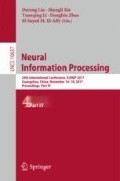Abstract
This paper mainly focuses on investigating the differences between males and females in emotion recognition using electroencephalography (EEG) and eye movement data. Four basic emotions are considered, namely happy, sad, fearful and neutral. The Bimodal Deep AutoEncoder (BDAE) and the fuzzy-integral-based method are applied to fuse EEG and eye movement data. Our experimental results indicate that gender differences do exist in neural patterns for emotion recognition; eye movement data is not as good as EEG data for examining gender differences in emotion recognition; the activation of the brains for females is generally lower than that for males in most bands and brain areas especially for fearful emotions. According to the confusion matrix, we observe that the fearful emotion is more diverse among women compared with men, and men behave more diversely on the sad emotion compared with women. Additionally, individual differences in fear are more pronounced than other three emotions for females.
Access this chapter
Tax calculation will be finalised at checkout
Purchases are for personal use only
References
Duan, R.N., Zhu, J.Y., Lu, B.L.: Differential entropy feature for EEG-based emotion classification. In: 6th International IEEE/EMBS Conference on Neural Engineering, vol. 8588, pp. 81–84 (2013)
Imaizumi, S., Homma, M., Ozawa, Y., Maruishi, M., Muranaka, H.: Gender differences in emotional prosody processing-an fMRI study. Psychologia 47(2), 113–124 (2004)
Liu, W., Zheng, W.-L., Lu, B.-L.: Emotion recognition using multimodal deep learning. In: Hirose, A., Ozawa, S., Doya, K., Ikeda, K., Lee, M., Liu, D. (eds.) ICONIP 2016. LNCS, vol. 9948, pp. 521–529. Springer, Cham (2016). doi:10.1007/978-3-319-46672-9_58
Lu, Y., Zheng, W.L., Li, B., Lu, B.L.: Combining eye movements and EEG to enhance emotion recognition. In: International Conference on Artificial Intelligence, pp. 1170–1176 (2015)
Mclean, C.P., Anderson, E.R.: Brave men and timid women? A review of the gender differences in fear and anxiety. Clin. Psychol. Rev. 29(6), 496–505 (2009)
Sugeno, M.: Theory of fuzzy integrals and its applications. Ph.D. thesis. Tokyo Institute of Technology (1974)
Schienle, A., Schäfer, A., Stark, R., Walter, B., Vaitl, D.: Gender differences in the processing of disgust- and fear-inducing pictures: an fMRI study. NeuroReport 16(3), 277–80 (2005)
Wang, X.W., Nie, D., Lu, B.L.: Emotional state classification from EEG data using machine learning approach. Neurocomputing 129(4), 94–106 (2014)
Weiss, E., Siedentopf, C.M., Hofer, A., Deisenhammer, E.A., Hoptman, M.J., Kremser, C., Golaszewski, S., Felber, S., Fleischhacker, W.W., Delazer, M.: Sex differences in brain activation pattern during a visuospatial cognitive task: a functional magnetic resonance imaging study in healthy volunteers. Neurosci. Lett. 344(3), 169–72 (2003)
Zheng, W.L., Dong, B.N., Lu, B.L.: Multimodal emotion recognition using EEG and eye tracking data. In: 36th Annual International Conference of the IEEE Engineering in Medicine and Biology Society, pp. 5040–5043. IEEE (2014)
Zheng, W.L., Zhu, J.Y., Lu, B.L.: Identifying stable patterns over time for emotion recognition from EEG. IEEE Trans. Affect. Comput. 99, 1 (2017)
Zhu, J.-Y., Zheng, W.-L., Lu, B.-L.: Cross-subject and cross-gender emotion classification from EEG. In: Jaffray, D.A. (ed.) World Congress on Medical Physics and Biomedical Engineering, June 7-12, 2015, Toronto, Canada. IP, vol. 51, pp. 1188–1191. Springer, Cham (2015). doi:10.1007/978-3-319-19387-8_288
Acknowledgments
This work was supported in part by grants from the National Key Research and Development Program of China (Grant No. 2017YFB1002501), the National Natural Science Foundation of China (Grant No. 61673266), the Major Basic Research Program of Shanghai Science and Technology Committee (Grant No. 15JC1400103), ZBYY-MOE Joint Funding (Grant No. 6141A02022604), and the Technology Research and Development Program of China Railway Corporation (Grant No. 2016Z003-B).
Author information
Authors and Affiliations
Corresponding author
Editor information
Editors and Affiliations
Rights and permissions
Copyright information
© 2017 Springer International Publishing AG
About this paper
Cite this paper
Yan, X., Zheng, WL., Liu, W., Lu, BL. (2017). Identifying Gender Differences in Multimodal Emotion Recognition Using Bimodal Deep AutoEncoder. In: Liu, D., Xie, S., Li, Y., Zhao, D., El-Alfy, ES. (eds) Neural Information Processing. ICONIP 2017. Lecture Notes in Computer Science(), vol 10637. Springer, Cham. https://doi.org/10.1007/978-3-319-70093-9_56
Download citation
DOI: https://doi.org/10.1007/978-3-319-70093-9_56
Published:
Publisher Name: Springer, Cham
Print ISBN: 978-3-319-70092-2
Online ISBN: 978-3-319-70093-9
eBook Packages: Computer ScienceComputer Science (R0)

